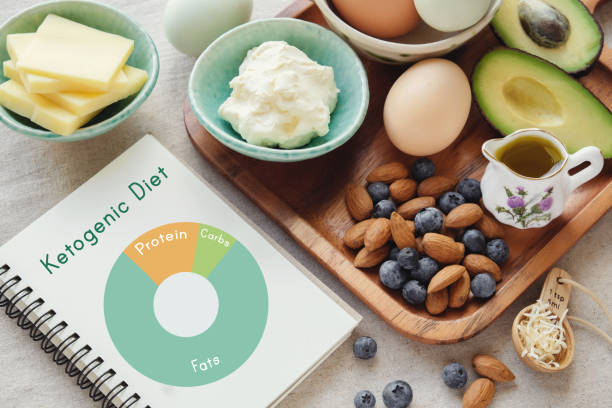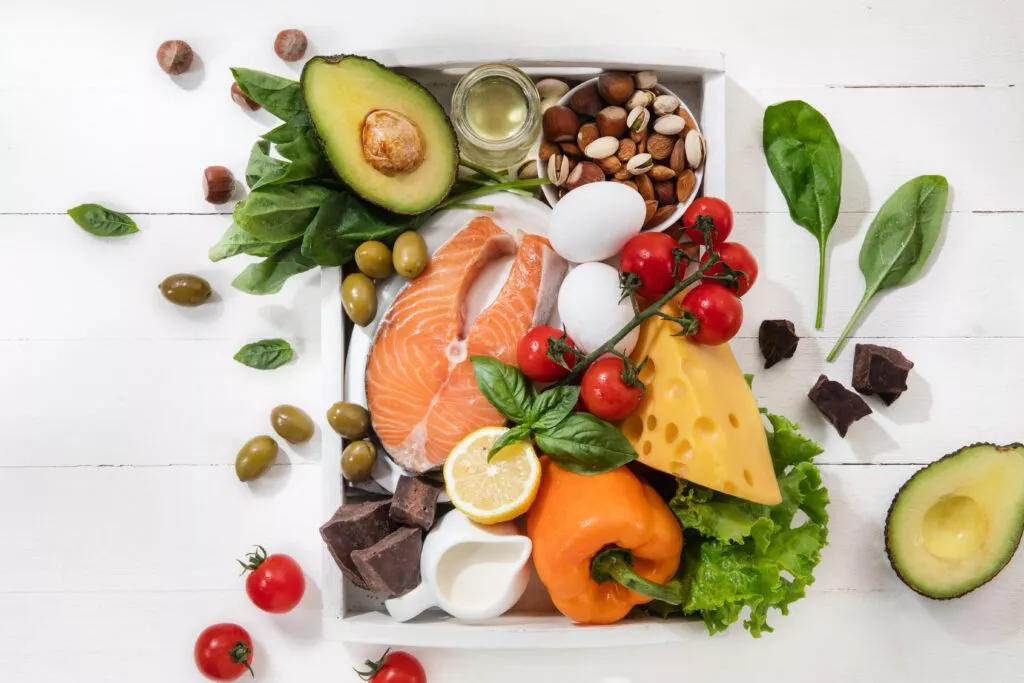Effective diet and weight loss involve a balanced approach that combines healthy eating habits, regular physical activity, and lifestyle changes. Focus on consuming nutrient-dense foods like fruits, vegetables, lean proteins, and whole grains while limiting processed foods, sugars, and unhealthy fats. Portion control is crucial to avoid overeating.
Incorporate regular exercise into your routine, including both aerobic activities and strength training. Aim for at least 150 minutes of moderate-intensity aerobic exercise per week, along with muscle-strengthening activities on two or more days.
Stay hydrated by drinking plenty of water throughout the day, which can help control appetite and support overall health. Prioritize quality sleep, as insufficient rest can disrupt metabolism and lead to weight gain.
Consistency is key in maintaining a healthy weight. Make gradual, sustainable changes rather than opting for drastic diets. Set realistic goals, track your progress, and celebrate small achievements along the way. Seek support from friends, family, or a healthcare professional to stay motivated and accountable. Remember, a successful weight loss journey is not just about shedding pounds but also about adopting a lifelong commitment to a healthier lifestyle.
What’s the Best Diet for Weight Loss?

The best diet for weight loss is one that is sustainable, balanced, and tailored to individual needs. A combination of healthy eating habits and lifestyle choices is crucial. Consider adopting a diet that emphasizes whole, nutrient-dense foods, such as fruits, vegetables, lean proteins, and whole grains. Incorporate a variety of foods to ensure a well-rounded intake of essential nutrients.
Portion control is key, as consuming fewer calories than your body needs can contribute to weight loss. Be mindful of portion sizes and avoid overeating, even when choosing healthy foods.
It’s essential to stay hydrated by drinking plenty of water throughout the day, as sometimes thirst can be mistaken for hunger. Limit the intake of sugary beverages and alcohol, as they contribute empty calories.
Choose cooking methods like grilling, steaming, or baking instead of frying, and prioritize healthy fats from sources like avocados, nuts, and olive oil. Be cautious with processed foods, as they often contain hidden sugars, unhealthy fats, and additives that can hinder weight loss efforts.
Regular physical activity is a crucial component of any weight loss plan. Aim for a combination of aerobic exercises, such as walking, jogging, or cycling, and strength training to build muscle and boost metabolism.
The best diet for weight loss is one that aligns with your preferences, fits your lifestyle, and promotes a sustainable, long-term approach to health and well-being. Consult with a healthcare professional or a registered dietitian for personalized advice based on your individual needs and health status.
What’s the Healthiest Diet?

The healthiest diet is one that prioritizes a well-balanced and varied intake of nutrient-dense foods, providing the body with essential vitamins, minerals, and other nutrients. A diet rich in fruits, vegetables, whole grains, lean proteins, and healthy fats forms the foundation of optimal nutrition.
Emphasize a colorful array of fruits and vegetables to ensure a broad spectrum of vitamins and antioxidants. Whole grains, such as brown rice, quinoa, and oats, contribute fiber for digestive health and sustained energy.
Include lean proteins from sources like poultry, fish, beans, legumes, and nuts, as they provide essential amino acids for muscle function and repair. Healthy fats, found in avocados, nuts, seeds, and olive oil, are important for brain health and overall well-being.
Moderation is key when it comes to processed foods, sugary snacks, and refined carbohydrates. Limiting the intake of added sugars, salt, and unhealthy fats helps prevent various health issues, including cardiovascular diseases and obesity.
Staying hydrated with water and choosing herbal teas over sugary beverages is essential for overall health. Portion control is crucial, and mindful eating can help prevent overconsumption.
Adopting a healthy lifestyle also includes regular physical activity, sufficient sleep, and stress management. It’s important to note that individual nutritional needs may vary, and consulting with a healthcare professional or registered dietitian can provide personalized guidance based on specific health goals and requirements.
What is Intermittent Fasting?

Intermittent fasting (IF) is an eating pattern that alternates between periods of eating and fasting. It does not prescribe specific foods to eat but rather focuses on when to eat. There are several methods of intermittent fasting, each defining the fasting and eating windows differently.
One common approach is the 16/8 method, also known as the Leangains protocol, where individuals fast for 16 hours and restrict their eating to an 8-hour window each day. Another method is the 5:2 diet, which involves eating normally for five days a week and drastically reducing calorie intake (usually around 500-600 calories) on the remaining two non-consecutive days.
During fasting periods, the body relies on stored glycogen and, eventually, on fat for energy since insulin levels drop. This can contribute to weight loss, as the body enters a state of ketosis, where it burns fat for fuel.
Intermittent fasting may offer various health benefits, such as improved metabolic health, reduced inflammation, and potential longevity benefits. Some studies suggest it may help with weight loss, blood sugar regulation, and cardiovascular health.
It’s essential to approach intermittent fasting with caution, especially for those with certain medical conditions or a history of eating disorders. Consulting with a healthcare professional before starting any fasting regimen is advisable, and individual experiences with intermittent fasting can vary, so finding an approach that fits one’s lifestyle and preferences is key to long-term success.
What’s a High-Fat Weight Loss Diet?

A high-fat weight loss diet is a nutritional approach that emphasizes consuming a significant portion of daily calories from healthy fats while limiting carbohydrates. One popular version of this diet is the ketogenic diet (keto), which induces a state of ketosis where the body primarily burns fat for fuel. Here are key elements of a high-fat weight loss diet:
- Healthy Fats: Focus on incorporating sources of healthy fats such as avocados, olive oil, nuts, seeds, and fatty fish. These fats provide essential fatty acids and contribute to satiety.
- Low Carbohydrate Intake: Restrict the intake of carbohydrates, especially refined sugars and grains. This reduction in carbohydrates forces the body to rely on fat for energy.
- Moderate Protein: Moderate protein intake is typically recommended to prevent excessive gluconeogenesis (conversion of protein to glucose), which could interfere with ketosis.
- Ketosis: Achieve and maintain a state of ketosis by keeping carbohydrate intake low enough to trigger the production of ketones. This metabolic state promotes fat burning.
- Whole Foods: Choose nutrient-dense, whole foods to ensure a well-rounded intake of vitamins and minerals. Include non-starchy vegetables and leafy greens.
While some people find success with high-fat weight loss diets, it’s essential to approach them carefully. Consult with a healthcare professional or a registered dietitian to ensure that the diet aligns with individual health goals and needs. Long-term adherence and potential side effects should also be considered before adopting a high-fat weight loss diet.
What does a Healthy Eating Plate Look Like?

A Healthy Eating Plate serves as a visual guide for creating balanced and nutritious meals, developed by nutrition experts at the Harvard T.H. Chan School of Public Health. Here’s an overview of what a Healthy Eating Plate typically looks like:
- Fruits and Vegetables (Half the Plate): Fill half of your plate with a colorful variety of fruits and vegetables. These provide essential vitamins, minerals, fiber, and antioxidants.
- Whole Grains (One-Quarter of the Plate): Allocate a quarter of your plate to whole grains like brown rice, quinoa, whole wheat, or oats. Whole grains offer sustained energy and additional fiber.
- Protein (One-Quarter of the Plate): Dedicate another quarter of your plate to lean protein sources such as poultry, fish, beans, lentils, tofu, or nuts. Protein is essential for muscle function and repair.
- Healthy Fats: Include sources of healthy fats, like olive oil, avocados, nuts, and seeds. These fats contribute to heart health and help absorb fat-soluble vitamins.
- Water or Healthy Beverages: Hydrate with water or other low-calorie, nutritious beverages. Minimize sugary drinks and limit alcohol intake.
- Limit Refined Grains and Processed Foods: Reduce intake of refined grains and processed foods, as they often contain added sugars, unhealthy fats, and fewer nutrients.
- Watch Portion Sizes: Be mindful of portion sizes to avoid overeating and promote weight control.
- Physical Activity: The Healthy Eating Plate often includes a side of physical activity, emphasizing the importance of staying active for overall well-being.
Adopting the Healthy Eating Plate concept encourages a balanced and varied diet, promoting overall health and reducing the risk of chronic diseases.
Pros and Cons

Pros of a Healthy Diet and Weight:
- Weight Management: A balanced diet, combined with appropriate portion control, supports healthy weight management.
- Nutrient Intake: A well-rounded diet provides essential nutrients, vitamins, and minerals necessary for optimal bodily functions.
- Disease Prevention: A healthy diet can reduce the risk of chronic diseases such as heart disease, diabetes, and certain cancers.
- Energy Levels: Proper nutrition contributes to sustained energy levels, helping individuals stay active and alert throughout the day.
- Improved Mood and Mental Health: Nutrient-rich foods can positively impact mood and mental well-being.
- Digestive Health: A diet rich in fiber from fruits, vegetables, and whole grains supports digestive health and prevents constipation.
- Strong Bones and Teeth: Adequate intake of calcium and vitamin D supports bone health.
- Better Sleep: Good nutrition is linked to improved sleep quality and overall sleep patterns.
Cons of Poor Diet and Excess Weight:
- Weight-Related Health Issues: Excess weight is associated with an increased risk of various health problems, including heart disease, diabetes, and joint issues.
- Nutrient Deficiencies: Poor diet can lead to deficiencies in essential nutrients, contributing to various health issues.
- Digestive Problems: Diets high in processed foods and low in fiber can contribute to digestive problems and irregular bowel movements.
- Increased Risk of Chronic Diseases: Unhealthy eating habits are linked to the development of chronic diseases, such as hypertension and certain types of cancer.
- Low Energy Levels: Diets high in sugar and processed foods can lead to energy spikes followed by crashes, affecting overall energy levels.
- Poor Mental Health: Nutrient-poor diets may negatively impact mental health, contributing to conditions like depression and anxiety.
- Increased Fatigue: Poor nutrition can lead to fatigue and a lack of motivation, hindering physical activity.
- Body Image Issues: Excess weight or poor diet choices can contribute to negative body image and self-esteem issues.
Balancing a healthy diet with regular physical activity is crucial for overall well-being and can help mitigate the negative effects associated with poor diet and excess weight.
Conclusion

In conclusion, the relationship between diet and weight is intricate and plays a significant role in overall health and well-being. A balanced diet rich in fruits, vegetables, lean proteins, whole grains, and healthy fats offers numerous benefits, including weight management, disease prevention, and improved energy levels.
Maintaining a healthy weight through proper nutrition supports optimal bodily functions and reduces the risk of chronic diseases such as heart disease, diabetes, and certain cancers. Additionally, nutrient-dense foods contribute to better digestion, stronger bones, and improved mental health.
Conversely, poor dietary habits and excess weight can lead to a myriad of health issues, including nutrient deficiencies, digestive problems, chronic diseases, and low energy levels. Furthermore, negative body image and self-esteem issues may arise as a result of unhealthy weight management practices.
It is essential to adopt a balanced approach to diet and weight management, focusing on nourishing the body with wholesome foods, practicing portion control, and engaging in regular physical activity. Consulting with healthcare professionals and registered dietitians can provide personalized guidance and support in achieving and maintaining a healthy weight and lifestyle.
By prioritizing nutritious foods, mindful eating habits, and lifestyle changes, individuals can optimize their health, vitality, and quality of life for years to come.

